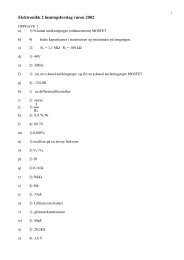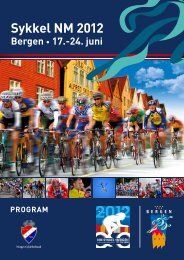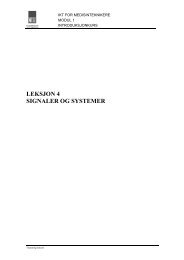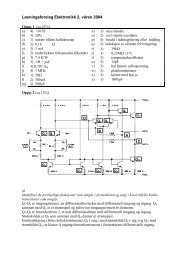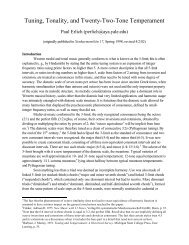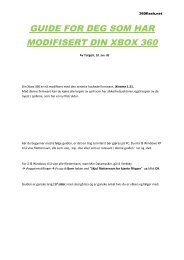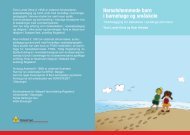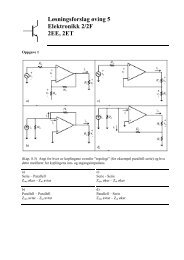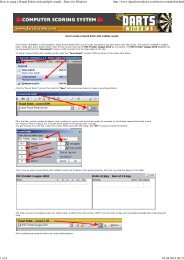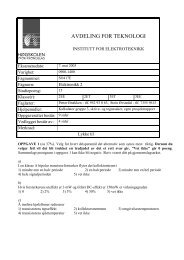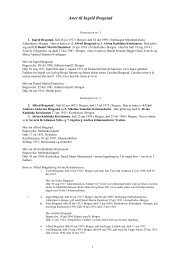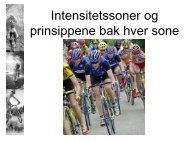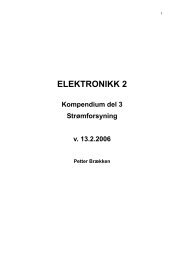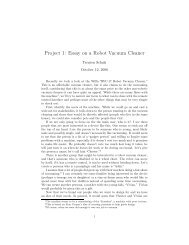The Online World resources handbook
The Online World resources handbook
The Online World resources handbook
You also want an ePaper? Increase the reach of your titles
YUMPU automatically turns print PDFs into web optimized ePapers that Google loves.
Keep what you find! http://home.eunet.no/~presno/bok/14.html<br />
Some people just delete all mail they don't want, and let the rest remain intact in their<br />
original folders. Most mail folders are easy to search with tools like AltaVista<br />
Discovery and Lookfor (see below), so this may be a solution for them.<br />
Personally, I get too much mail for that. When I read it, my preferred method is to<br />
cut out what I need, and store the texts without the lengthy mailer headers in a more<br />
systematic way. I do this to reduce disk storage requirements, and speed up searches.<br />
My mail is stored in files and directories using names that show the source of the<br />
information. This makes it quick to find where to search. A set of macro commands<br />
make cutting and appending mail easy.<br />
Often, I use the year, or a month/year code, in the file name extension. For<br />
example, the file TOW.96 contains messages retrieved from the TOW mailing list during<br />
1996.<br />
Some advanced email programs have these features built in. With Eudora Light it is<br />
easy. Click on Transfer, and dump the message into a mailbox (or folder) of your choice.<br />
You may also use your favorite word processor, or something else. <strong>The</strong>re are<br />
several alternatives. Personally, I use the LIST utility in my system.<br />
LIST is my favorite MS DOS shareware file viewer program. You can retrieve it<br />
from the Internet, and most bulletin boards. Using LIST, it is difficult to destroy your<br />
precious retrieved data while reading, cutting and pasting.<br />
MORE ABOUT LIST: Assume that you want to postprocess Eudora's<br />
IN.MBX file, and that you are using the file name convention suggested<br />
above. Type LIST and press ENTER. A list of file names in your Eudora<br />
directory will appear on your screen. Press S to sort the list, D to have<br />
them sorted by creation date. <strong>The</strong> newest files are at the bottom of the list.<br />
Move the cursor (using the Arrow keys) to the input file you want to<br />
read, and press ENTER. Scroll up and down in IN.MBX by pressing the<br />
PgUp/PgDn or the arrow keys.<br />
On your screen is a piece of information that you want to keep for<br />
future reference. Mark the text with ALT M commands (keep the ALT key<br />
pressed down, while pressing M), and then ALT D. LIST will ask you for a<br />
file name. If the information is from the TOW mailing list, and the year is<br />
1996, enter TOW.96, and the text is appended to what is already there.<br />
This method allows you quickly to mark and append parts of your<br />
input file to various archive files. Press ESC to return to the file list when<br />
through. If you press D, LIST asks if you really want to delete the file.<br />
Press Y, and IN.MBX is gone. However, you'd better use Eudora for<br />
deleting mail!<br />
LIST lets you find information stored in your archives (string<br />
search). What you find can be marked and copied to a work file. It can<br />
also be set to invoke an editor or a word processor for the selected file.<br />
Reuse data on your hard disk<br />
Over time your personal archives will grow in size. You begin to experience the benefits<br />
of having all this information on your hard disk. Yesterday's news is today's history, and<br />
may be used in interesting ways.<br />
One business executive regularly monitors key technologies, customers,<br />
competitors, and suppliers. He does it by tapping sources like Kompass, Associated<br />
Press, and Reuters. Interesting bits of information are regularly stored on his disk.<br />
Tomorrow, there is an important meeting with a major customer. First, a quick<br />
search through the personal customer database to be reminded of important events since<br />
the last meeting. An unfamiliar person is also going to be present. Maybe there is some<br />
background information, for example about a recent promotion.<br />
Next, a quick check on major competitors. Maybe they are up to something that he<br />
needs to know about.<br />
With efficient tools for searching your hard disk, finding information takes only a<br />
few seconds. If you are still left with questions, go online to complement.<br />
Several modern email programs have built in search features that can do more than<br />
5 of 7 23.11.2009 15:48



